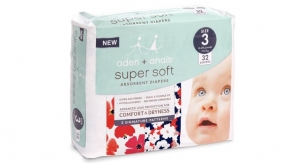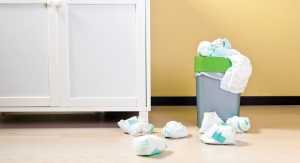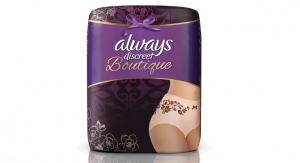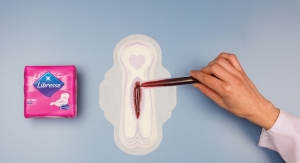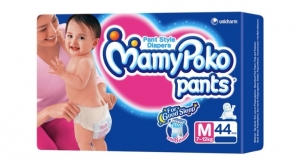Karen McIntyre, Editor02.02.18
If you read the news, you would think the U.S. baby diaper market is in a bust. This week CNN reports that the birth rate dropped to a historic low in 2017 as would-be parents pushed back parenthood. At the same time, the $12.6 billion diaper market is seeing slow growth rates and intense competition.
This bad news may have been confirmed this week, when Kimberly-Clark, one of the largest makers of diapers in not just the U.S. but the world, announced a plan to reduce its workforce by 13% and close down 10 of its global manufacturing sites in an effort to make it leaner and more competitive across all of its markets.
However, while a 13% workforce reduction sounds about as ominous of news as it comes, K-C execs were decidedly optimistic about this plan and its impact moving forward as well as about its brands in the global hygiene market.
In fact, the top brass at K-C told analysts they could expect some serious innovation coming out its factories in 2018 because the company wants very much to compete on innovation—not cost.
It seems that today’s diaper purchasers are definitely more interested in value than they are in price. The problem that K-C, and its main competitor Procter & Gamble, have is innovation is everywhere in the market. Gone are the days of the low-cost (and by extension low quality) store brand. Now, non-branded makers of diapers are offering their own suite of features and allowing more companies than ever to enter the market.
Just last month, aden + anais, an Australian manufacturer of the softest swaddle blankets you’ll ever touch, said it would enter the diaper market with an ultra-soft product that features the same precious designs found on the blankets. Described as ultra-absorbent with a snug, flexible fit, these diapers include other features like leak guard protection and an extra soft topsheet, clearly placing them in the premium—if not ultra-premium—market. The company is hoping it can parlay its blanket’s popularity into success in diapers.
A few years ago, it would have been unheard of for a small, boutique brand to enter the baby diaper market, but the emergence of innovative diaper manufacturers—like Drylock, Mabesa or Domtar—who are happy serving customers either in the private label or contract manufacturing space, have opened up doors for new companies. In the past few years alone, we have seen success from The Honesty Company, Parasol and Babyganics, to name a few. These companies had a vision of what was lacking in the diaper market and did something about it. It seems like today’s parents—or at least some of them—are responding.
These smaller companies have changed the game in diapers. Large companies like K-C and P&G need to be faster and better able to react to markets trends, which is why K-C’s announcement that it is shuttering 10 plants and reducing its workforce significantly possibly ? isn’t the result of a market bust but actually a diaper boom.
Karen McIntyre
Editor
kmcintyre@rodmanmedia.com
This bad news may have been confirmed this week, when Kimberly-Clark, one of the largest makers of diapers in not just the U.S. but the world, announced a plan to reduce its workforce by 13% and close down 10 of its global manufacturing sites in an effort to make it leaner and more competitive across all of its markets.
However, while a 13% workforce reduction sounds about as ominous of news as it comes, K-C execs were decidedly optimistic about this plan and its impact moving forward as well as about its brands in the global hygiene market.
In fact, the top brass at K-C told analysts they could expect some serious innovation coming out its factories in 2018 because the company wants very much to compete on innovation—not cost.
It seems that today’s diaper purchasers are definitely more interested in value than they are in price. The problem that K-C, and its main competitor Procter & Gamble, have is innovation is everywhere in the market. Gone are the days of the low-cost (and by extension low quality) store brand. Now, non-branded makers of diapers are offering their own suite of features and allowing more companies than ever to enter the market.
Just last month, aden + anais, an Australian manufacturer of the softest swaddle blankets you’ll ever touch, said it would enter the diaper market with an ultra-soft product that features the same precious designs found on the blankets. Described as ultra-absorbent with a snug, flexible fit, these diapers include other features like leak guard protection and an extra soft topsheet, clearly placing them in the premium—if not ultra-premium—market. The company is hoping it can parlay its blanket’s popularity into success in diapers.
A few years ago, it would have been unheard of for a small, boutique brand to enter the baby diaper market, but the emergence of innovative diaper manufacturers—like Drylock, Mabesa or Domtar—who are happy serving customers either in the private label or contract manufacturing space, have opened up doors for new companies. In the past few years alone, we have seen success from The Honesty Company, Parasol and Babyganics, to name a few. These companies had a vision of what was lacking in the diaper market and did something about it. It seems like today’s parents—or at least some of them—are responding.
These smaller companies have changed the game in diapers. Large companies like K-C and P&G need to be faster and better able to react to markets trends, which is why K-C’s announcement that it is shuttering 10 plants and reducing its workforce significantly possibly ? isn’t the result of a market bust but actually a diaper boom.
Karen McIntyre
Editor
kmcintyre@rodmanmedia.com






